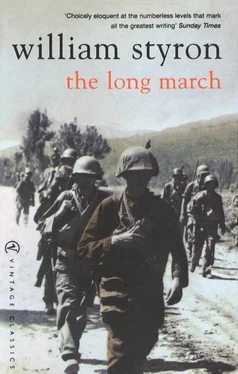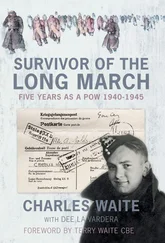William Styron - The Long March
Здесь есть возможность читать онлайн «William Styron - The Long March» весь текст электронной книги совершенно бесплатно (целиком полную версию без сокращений). В некоторых случаях можно слушать аудио, скачать через торрент в формате fb2 и присутствует краткое содержание. Город: New York, Год выпуска: 1952, ISBN: 1952, Издательство: Vintage Classics, Жанр: prose_military, на английском языке. Описание произведения, (предисловие) а так же отзывы посетителей доступны на портале библиотеки ЛибКат.
- Название:The Long March
- Автор:
- Издательство:Vintage Classics
- Жанр:
- Год:1952
- Город:New York
- ISBN:978-0099422792
- Рейтинг книги:3 / 5. Голосов: 1
-
Избранное:Добавить в избранное
- Отзывы:
-
Ваша оценка:
- 60
- 1
- 2
- 3
- 4
- 5
The Long March: краткое содержание, описание и аннотация
Предлагаем к чтению аннотацию, описание, краткое содержание или предисловие (зависит от того, что написал сам автор книги «The Long March»). Если вы не нашли необходимую информацию о книге — напишите в комментариях, мы постараемся отыскать её.
The Long March — читать онлайн бесплатно полную книгу (весь текст) целиком
Ниже представлен текст книги, разбитый по страницам. Система сохранения места последней прочитанной страницы, позволяет с удобством читать онлайн бесплатно книгу «The Long March», без необходимости каждый раз заново искать на чём Вы остановились. Поставьте закладку, и сможете в любой момент перейти на страницу, на которой закончили чтение.
Интервал:
Закладка:
But he went no further, for the Colonel had made a curious, quick gesture—stage-gesture, fantastic and subtle, and it was like watching an old cowboy film to see the Colonel’s hand go swiftly back to the handle of his pistol and rest there, his eyes cool and passionate and forbidding. It was a gesture of force which balked even the Captain. Man-nix’s face went pale—as if he had only just then realized the words which had erupted so heedlessly from his mouth—and he said nothing, only stood there sullen and beaten and blinking at the glossy white handle of the pistol as the Colonel went on: “For your information, Captain, you aren’t the only one who made this march. But I’m not interested in your observations. You quiet down now. hear? You march in, see? I order you confined to your quarters, and I’m going to see that you get a court-martial. Do you understand? I’m going to have you tried for gross insubordination. I’ll have you sent to Korea. Keep your mouth shut. Now get back to your company!” He was shaking with wrath; the hot morning light beat with piety and with vengeance from his gray, outraged eyes. “Get back to your men,” he whispered, “ get back to your men!”
Then he turned his back to the Captain and called down the road to the Major: “All right, Billy, let’s saddle up!”
So it was over, but not quite all. The last six miles took until past noon. Mannix’s perpetual tread on his toe alone gave to his gait a ponderous, bobbing motion which resembled that of a man wretchedly spastic and paralyzed. It lent to his face too—whenever Culver became detached from his own misery long enough to glance at him—an aspect of deep, almost prayerfully passionate concentration—eyes thrown skyward and lips fluttering feverishly in pain—so that if one did not know he was in agony one might imagine that he was a communicant in rapture, offering up breaths of hot desire to the heavens. It was impossible to imagine such a distorted face; it was the painted, suffering face of a clown, and the heaving gait was a grotesque and indecent parody of a hopeless cripple, with shoulders gyrating like a seesaw and with flapping, stricken arms. The Colonel and the Major had long since outdistanced them, and Culver and Mannix walked alone. When the base came into sight, he was certain they were not going to make it. They trudged into the camp. Along the barren, treeless streets marines in neat khaki were going to lunch, and they turned to watch the mammoth gyrating Captain, so tattered and soiled—who addressed convulsive fluttering prayers to the sky, and had obviously parted with his senses. Then Mannix stopped suddenly and grasped Culver’s arm. “What the hell,” he whispered, “we’ve made it.” v
For a long while Culver was unable to sleep. He had lain naked on his bed for what seemed hours, but unconsciousness would not come; his closed eyes offered up only vistas of endless roads, steaming thickets, fields, tents— sunshine and darkness illogically commingled—and the picture, which returned to his mind with the unshakable regularity of a scrap of music, of the boys who lay dead beneath the light of another noon. Try as he could, sleep would not come. So he dragged himself erect and edged toward the window, laboriously, because of his battered feet; it took him a full minute to do so, and his legs, like those of an amputee which possess the ghost of sensation, felt as if they were still in motion, pacing endless distances. He lowered himself into a chair and lighted a cigarette. Below, the swimming pool was grotto-blue, a miniature of the cloudless sky above, lit with shapes of dancing light as shiny as silver dimes. A squad of sunsuited maidens, officers’ wives, splashed at its brink or ate icecream sundaes on the lawn, and filled the noontime with their decorous sunny laughter. It was hot and still. Far off above the pines, in the hot sunlight and over distant peace and civilization, brewed the smoky and threatful beginnings of a storm.
Culver let his head fall on his arm. Yes, they had had it—those eight boys—he thought, there was no doubt of that. In mindless slumber now, they were past caring, though diadems might drop or Doges surrender. They were ignorant of all. And that they had never grown old enough to know anything, even the tender miracle of pity, was perhaps a better ending—it was hard to tell. Faint warm winds came up from the river, bearing with them a fragrance of swamp and pine, and a last whisper of air passed through the trees, shuddered, died, became still; suddenly Culver felt a deep vast hunger for something he could not explain, nor ever could remember having known quite so ach-ingly before. He only felt that all of his life he had yearned for something that was as fleeting and as incommunicable, in its beauty, as that one bar of music he remembered, or those lovely little girls with their ever joyful, ever sprightly dance on some far and fantastic lawn—serenity, a quality of repose—he could not call it by name, but only knew that, somehow, it had always escaped him. As he sat there, with the hunger growing and blossoming within him, he felt that he had hardly ever known a time in his life when he was not marching or sick with loneliness or afraid.
And so, he thought, they had all had it, in their various fashions. The Colonel had had his march and his victory, and Culver could not say still why he was unable to hate him. Perhaps it was only because he was a different kind of man, different enough that he was hardly a man at all, but just a quantity of attitudes so remote from Culver’s world that to hate him would be like hating a cannibal, merely because he gobbled human flesh. At any rate, he had had it. And as for Mannix— well, he’d certainly had it, there was no doubt of that. Old Al, he thought tenderly. The man with the back unbreakable, the soul of pity— where was he now, great unshatterable vessel of longing, lost in the night, astray at mid-century in the never-endingness of war?
His hunger faded and died. He raised his head and gazed out the window. Over the pool a figure swan-dived against the sky, in crucified, graceless descent broke the water with a lumpy splash. A cloud passed over the day, darkening the lawn with a moment’s somber light. The conversation of the girls became subdued, civilized, general. Far off above the trees, on the remotest horizon, thunderheads bloomed, a squall. Later, toward sundown, they would roll landward over a shadowing reach of waves, borne nearer, ever more darkly across the coast, the green wild desolation of palmetto and cypress and pine—and here, where the girls pink and scanty in sun-suits would slant their tar-black eyes skyward in the gathering night, abandon pool and games and chatter and with shrill cries of warning flee homeward like gaudy scraps of paper on the blast, voices young and lovely and lost in the darkness, the onrushing winds. One thing, Culver thought, was certain—they were in for a blow. Already there would be signals up and down the coast.
Abruptly he was conscious of a dry, parched thirst. He rose to his feet, put on a robe, and hobbled out into the hallway toward the water cooler. As he rounded the corner he saw Mannix, naked except for a towel around his waist, making his slow and agonized way down the hall. He was hairy and enormous and as he inched his way toward the shower room, clawing at the wall for support, his face with its clenched eyes and taut, drawn-down mouth was one of tortured and gigantic suffering. The swelling at his ankle was the size of a grapefruit, an ugly blue, and this leg he dragged behind him, a dead weight no longer capable of motion.
Culver started to limp toward him, said, “Al—” in an effort to help him along, but just then one of the Negro maids employed in the place came swinging along with a mop, stopped, seeing Mannix, ceased the singsong little tune she was humming, too, and said, “Oh my, you poor man. What you been doin’? Do it hurt?” Culver halted.
Читать дальшеИнтервал:
Закладка:
Похожие книги на «The Long March»
Представляем Вашему вниманию похожие книги на «The Long March» списком для выбора. Мы отобрали схожую по названию и смыслу литературу в надежде предоставить читателям больше вариантов отыскать новые, интересные, ещё непрочитанные произведения.
Обсуждение, отзывы о книге «The Long March» и просто собственные мнения читателей. Оставьте ваши комментарии, напишите, что Вы думаете о произведении, его смысле или главных героях. Укажите что конкретно понравилось, а что нет, и почему Вы так считаете.






![Джеффри Арчер - The Short, the Long and the Tall [С иллюстрациями]](/books/388600/dzheffri-archer-the-short-the-long-and-the-tall-s-thumb.webp)





